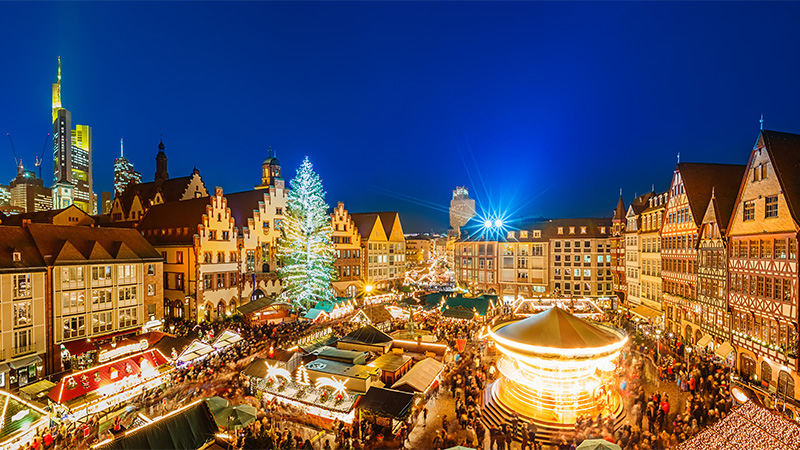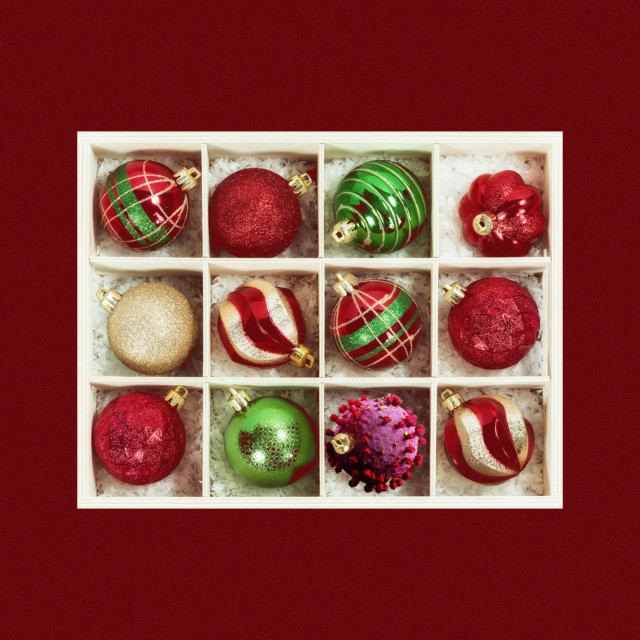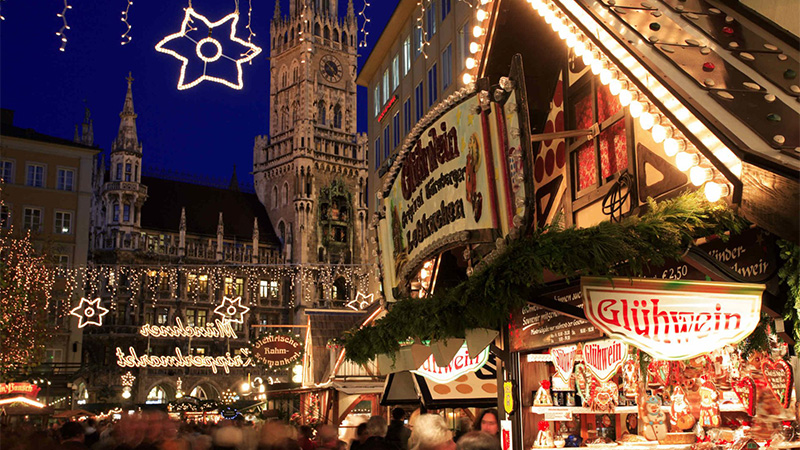VinePair is ringing in the Holiday Cheers with a spotlight on the bottles we’re gifting (and hoping to receive) and a look inside some of our favorite holiday traditions and recipes — from elevated eggnog to all things bubbly. Plus, we’ll be reflecting on the past year in the beverage industry and shifting our focus to the drinks trends we expect to see in 2022.
From Brussels to Belgrade, Christmas markets are a cultural touchstone throughout much of Europe, offering a festive atmosphere filled with booths selling holiday wreaths, Christmas trees, ornaments, toys, crafts, food, and gifts — as well as mugs of mulled wine, shots of schnapps, and foam-capped half-liters of beer. And for a second straight winter, many of the most famous Christmas markets are shuttered due to the pandemic — hinting at a tough future for the entire hospitality and drinks industry.
Making Spirits Bright
In Munich, the annual Christkindlmarkt is one of the largest and oldest Christmas markets in all of Europe, one of about 3,000 that usually take place across Germany. On Nov. 16, Mayor Dieter Reiter announced that it would be canceled for the second year in a row.
“Anything else would cause an unjustifiable increase in the risk of infection and would send the wrong signal — especially to all the employees in our hospitals, who are working at their limits,” he said in a statement. “It is now a matter of avoiding large gatherings of people as far as possible.”
Despite full hospitals in many European cities due to the Omicron variant, not all governments have such strict restrictions. Some have canceled Christmas markets entirely. Some are still allowing markets, but not allowing the sale or consumption of food and drink.
In the Czech Republic, Christmas markets were canceled due to the state of emergency that was declared by the government on Nov. 25. However, crafts and farmers’ markets have been allowed to continue, which means that some vegetable stands now have a new focus on mistletoe and holly. As such, visitors can get a sense of the Christmas spirit, even if they can’t actually drink Christmas spirits there, as Kamila Bakotová of Prague City Tourism explains.
“This year, tourists can visit only the markets that stay open all year, where Christmas goods are also sold, but they cannot consume food and drinks they purchase on the spot,” she says.
The mix of regulations and terms has allowed Europeans to engage in a new variation on one of the Old World’s favorite activities: figuring out how to get around the law, while not completely breaking it.
In Innsbruck, Austria, you might not be able to purchase a mug of the mulled wine known as glühwein in German, or a lingonberry-topped kiachi pastry at a Christmas market. Although five of the city’s seven Christmas markets are now open and running after the country’s fall lockdown, they are not allowed to sell food and drink, says Peter Unsinn of Innsbruck Tourismus.
“But the restaurants and bars are allowed to offer takeaway,” he adds. “As the Christmas market stalls are built just next to the bars and restaurants of the Old Town, you still have the possibility to get a taste of glühwein while walking through the markets.”
That said, visitors will need to be Covid-free to enter Christmas markets, either with proof of vaccination or proof of recovery from infection. Moreover, a simple surgical mask won’t cut it: Visitors are also required to wear a much more robust FFP2 mask, similar to the N95 masks in North America. And no, it’s not easy to drink hot spiced wine through that.
A Difficult Season
Beyond the closed Christmas markets, the European drinks industry looks to be in for more tough sledding. Big events, including the Christmas Beer Festival in Essen, Belgium, scheduled for Dec. 17-18, and the winter edition of the Great British Beer Festival planned for Feb. 9-12 in Birmingham, England, were canceled.
On a day-to-day level, the industry is looking at another difficult season. While pubs, bars, and restaurants in the lager-loving Czech Republic are currently still allowed to open, hours have been limited, with a mandatory closing time of 10 p.m. During the state of emergency, drinking alcohol in public, a regular part of life throughout the region, has been banned in the country. Proof of vaccination or proof of recovery from a coronavirus infection is required for all guests in bars and restaurants.
“Everybody was smiling and a lot of beer was being poured and everything was really nice, and then it disappeared. It’s a nightmare.”
Similar restrictions for entry are popping up across Europe.
Kevin Brown, owner of Redwood Bar in Berlin, says that his customers have been polite when asked to show proof of vaccination, though it takes an unexpected toll on bar staff. “Policing their vaccine or recovery status is burdensome and inhospitable,” he says. Effectively, it is akin to the health department outsourcing its duties to bartenders and servers. “They resent doing the state’s work without any of the protections afforded state employees,” he adds.
At Berlin’s Vagabund Brauerei, co-founder Matt Walthall says his craft brewery has had to adapt in several ways, from pausing its expansion plans to focusing on a very limited bottle lineup instead of the huge variety of draft styles for which it was known. Last winter, he says, Vagabund survived in part by selling takeaway drinks — and not only beer.
“We had a real big bump as well as a lot of other bars last year selling glühwein out the window,” he says with a laugh. “For a couple months we made more money selling glühwein than we did beer. That’s a real big thing here in Berlin.”

Changing the Future
The pandemic seems likely to change Europe’s hospitality industry in at least a couple of ways, according to Daniel Bart, the founder of both Eleszto, a sprawling bar and restaurant in Budapest, and Hopfenreich, a craft beer bar in Berlin. To start, many experienced workers simply left the industry for good after the first set of lockdowns.
“Most of them found an easier job,” he says. “There was like a generation who was used to this work, and now that generation has left with the pandemic. And now there’s a big problem of how to fill up the ranks in the pubs.”
A second impact? A new kind of “seasonality” in the bar business, which feels very different from the ebbs and flows of the past.
“It’s like good turnover turned into a seasonal thing,” he says. “There was this complete lockdown, which was a really bad situation for the hospitality business. It kind of recovered, but then came these upheavals when, in the summer and the spring, people wanted to make up for lost time, and taps were just flowing. It was a really big time for the pubs, and then it suddenly went down again. And then we had like two weeks in November when it was really busy again for both Hopfenreich and Eleszto, and everybody was smiling and a lot of beer was being poured and everything was really nice, and then it disappeared. It’s a nightmare.”
Going forward, many in the industry are looking for new strategies. Vagabund should be in good shape thanks in part to a successful crowd-investing campaign this winter, but if the pandemic gets worse, a lot of hospitality businesses in Berlin and elsewhere simply won’t survive, Walthall says. If the public health situation does improve again, Vagabund and many others in Europe are hoping to get back to something close to normal in 2022.
“Maybe once it starts to warm up in the spring and the numbers go back down again, we can at least have the beer garden open and the outdoor space and have more direct contact with customers,” Walthall says. “People still are going out, but it’s certainly not where it used to be. I really miss the days where our taproom was packed with a hundred people in a 50- square-meter space.”
This story is a part of VP Pro, our free platform and newsletter for drinks industry professionals, covering wine, beer, liquor, and beyond. Sign up for VP Pro now!

